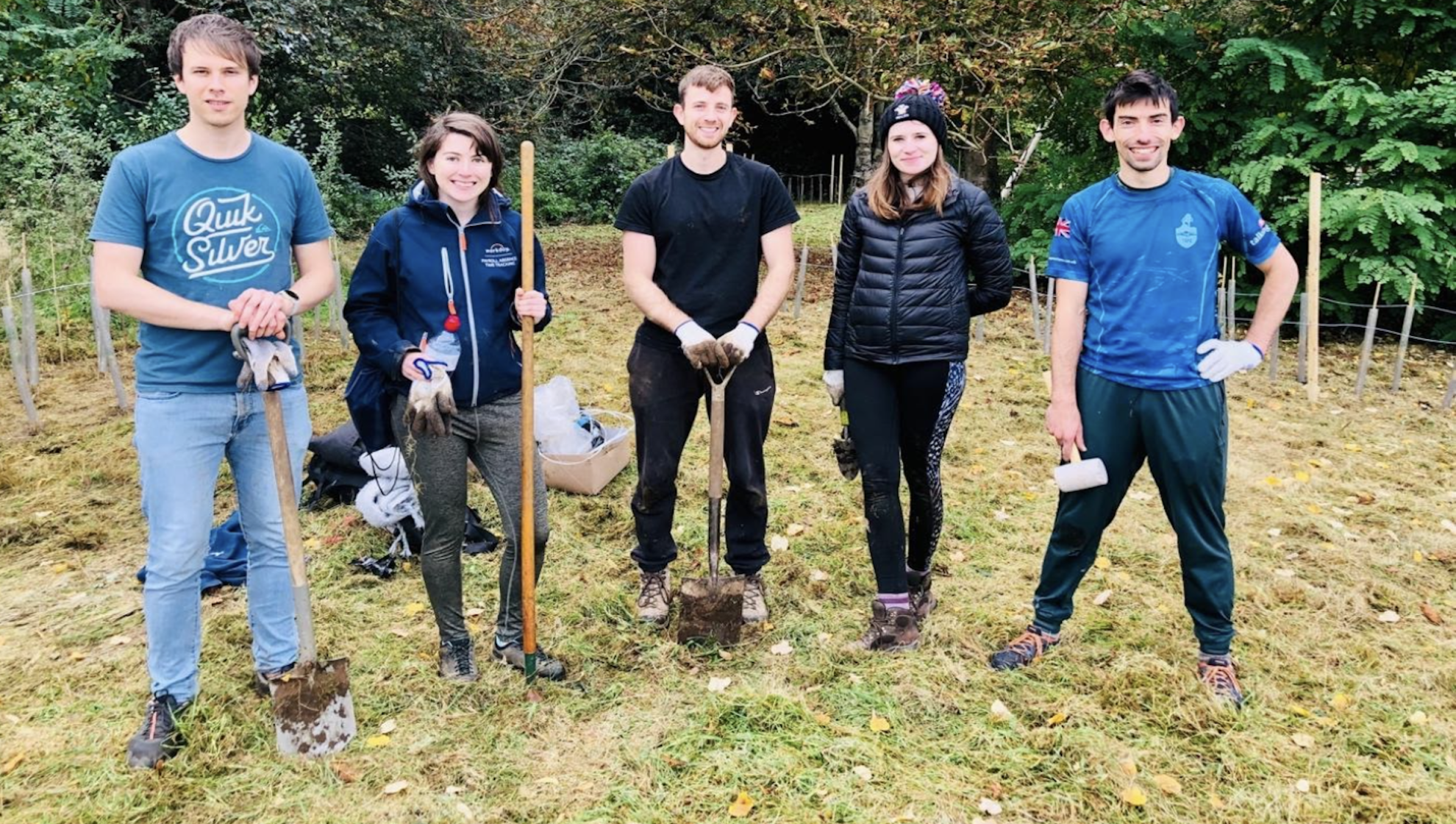GoCardless Environmental Action Day

Last editedOct 20213 min read
Last Friday, a group of GeeCees donned their wellies and gloves to take part in our very first Environmental Action Day, aiming to create a positive impact on the natural environment. On a beautiful Autumnal Friday in the Surrey countryside, we spent the day working alongside a community volunteer group and a local nursery school on a project with the goal of both protecting and enhancing biodiversity whilst increasing education and awareness.
We planted 350 trees to create hedgerows – using native species such as hawthorn, crab apple and Dog Rose – and 300 wildflower plants chosen specifically for bees and butterflies, alongside sowing a large area of wildflower seeds and installing bug-hotels; all with the aim of creating habitats to provide food and shelter for wildlife.
Why?
The importance of the natural world and the services it provides to us all has begun to become more and more evident, with the Dasgupta Review: The Economics of Biodiversity highlighting how “our economies, livelihoods and well-being all depend on our most precious asset: nature.” The natural world not only provides our natural resources – from water and oxygen to food and materials – but also absorbs our waste including our Greenhouse Gas Emissions.
More than ever, Biodiversity-Net-Gain is beginning to join Net-Zero on the corporate sustainability stage. The importance of biodiversity is becoming better understood, including the key role that pollinators such as bees play in pollinating ¾ of the crops which feed 90% of the world. Indeed, according to Forbes “between $235 and $577 billion worth of annual global food production relies on the contribution [of pollinators].”
Elsewhere, an IMF study looked at the services whales provide in helping to regulate our climate by absorbing up to 32 tCo2e in their lifetime. But - more importantly - where whales are found, so too are phytoplankton, which produce 50% of our oxygen and absorb 40% of our Co2, equivalent to four Amazon rainforests. The IMF estimates that the climate-value of the current whale population is ~$1trn.
Impact
Yet, currently, humanity consumes the equivalent of 1.6 Earths to provide our natural resources and absorb our waste. This unsustainable behaviour has negatively impacted the natural world, prompting discussion about the Biodiversity Emergency alongside the Climate Emergency. According to the State of Nature Report in the UK alone there has been a 13% decline in average species abundance since 1970 with 15% threatened with extension. Globally, the WWF Global Living Planet Index shows an average fall of 68% in wildlife from 1970-2016.
Indeed, many point to humanities continual encroachment upon the natural world as one of the drivers behind the rising frequency of epidemics and pandemics over recent years. In fact, a Covid-like pandemic was predicted back in 2007 following a study of the 2002-2003 SARS outbreak.
![[en-GB] Team Action Day](https://images.ctfassets.net/40w0m41bmydz/5jjOxIa9XJNwajt6FfvEzN/f8db1833545d291143f2d132627af2af/Screenshot_2021-10-27_at_18.44.15.png?w=1130&h=820&q=50&fm=png)
GoCardless team members planting trees
Global Action
However, earlier in October at the UN Cop15 for Biodiversity, a new framework for protecting and restoring biodiversity has been set out with key aims including:
Halting nature loss by 2030, and aim for net-gain thereafter
Ensuring all businesses assess and report on their dependencies and impacts on biodiversity, and progressively reduce negative impacts by at least half and increase positive impacts
Protecting at least 30% of land and sea; Beginning restoration on at least 20% of freshwater, marine and terrestrial ecosystems
Eliminating all plastic waste pollution
Eradicating climate mitigation efforts with negative impacts on biodiversity (Not planting trees to absorb carbon when it has a negative impact on the ecosystem)
GoCardless Next Steps
Although planting hedgerows and wildflowers creates (in a small way) a positive impact, our Environmental Action Day is only our first step; we will continue to explore opportunities for GeeCees to have a positive impact on the natural environment. Importantly, as we build upon our existing commitments to reduce our Greenhouse Gas Emissions and reaching Net-Zero, we are mindful that we do this in coalition with protecting and enhancing the natural world.
This means that we will not offset our emissions but seek to reduce our emissions in line-with the Science as a first principle.
While nature-based solutions – such as trees, grasslands, peatlands, seagrass etc – are undoubtedly important in climate action (alongside the many co-benefits), it is vital that the impact on ecosystems and communities is considered in a holistic manner. Protecting what exists already is crucial, and where planting is taking place, ensuring a diversity of the correct species is planted, to avoid mono-crop tree-shaped deserts. And after all, if all corporate Net-Zero strategies relied on tree planting alone, we would have no room to grow the food we all need.
